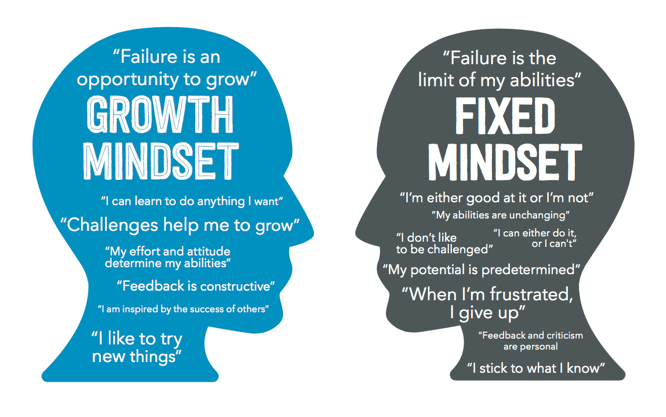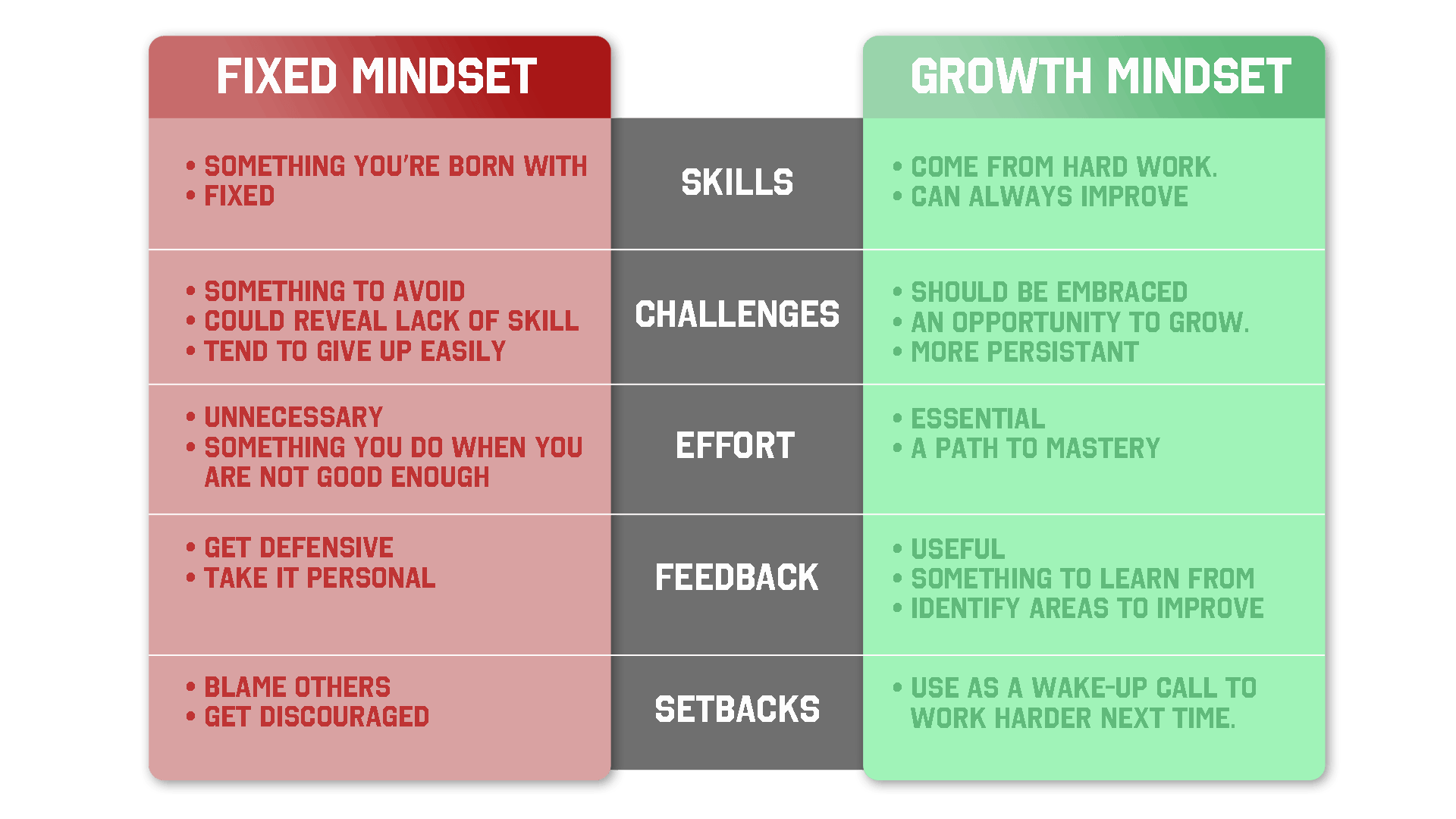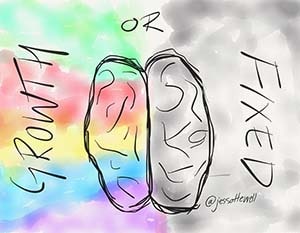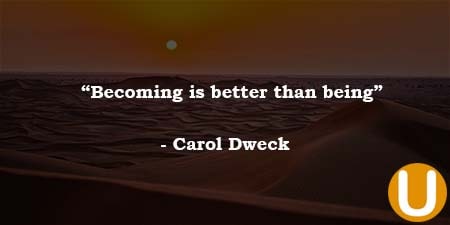Mindset by Carol Dweck Summary
Mindset Review in 3 Sentences
1. People have either a fixed or a growth mindset. Mindsets produce definite worldviews, but they can be changed.
2. People who consider their personal qualities unchangeable have a “fixed mindset.”
3. People who think they can improve or change their personality traits over time have a "growth mindset."
The 5 Big Ideas of this Book
1. “The view you adopt for yourself profoundly affects the way you lead your life.”
2. “Believing that your qualities are carved in stone—the fixed mindset—creates an urgency to prove yourself over and over”.
3. “People in a growth mindset don’t just seek challenge, they thrive on it”.
4. The fixed mindset: “I can’t do it”. The growth mindset: “I can’t do it yet”.
5. People with a growth mindset believe that the future presents an opportunity to grow, even during challenging times.
Mindset Summary
1. Fixed Mindset Vs. Growth Mindset

Fixed Mindset: Personality traits are unchangeable!
“Believing that your qualities are carved in stone—the fixed mindset—creates an urgency to prove yourself over and over. If you have only a certain amount of intelligence, a certain personality, and a certain moral character—well, then you’d better prove that you have a healthy dose of them. It simply wouldn’t do to look or feel deficient in these most basic characteristics”.
Those who view their personality or intelligence as unshakable have a “fixed mindset.” They believe that neither personality nor intelligence is subject to change and they feel the need to prove themselves constantly in all situations.
They believe that their personality traits are unchangeable, so they work hard to hide their weaknesses instead of trying to change and develop.
So, “Why waste time proving over and over how great you are, when you could be getting better? Why hide deficiencies instead of overcoming them?”
Growth Mindset: Personality traits can be improved
On the other hand, “The growth mindset is based on the belief that your basic qualities are things you can cultivate through your efforts. Although people may differ in every which way—in their initial talents and aptitudes, interests, or temperaments—everyone can change and grow through application and experience.”
People with a “growth mindset” believe that they can improve or change their personality traits over time. They love to learn, grow and build their talents. They believe that the future offers opportunities to grow, even during challenging times.
Just think about that, “What are the consequences of thinking that your intelligence or personality is something you can develop, as opposed to something that is a fixed, deep-seated trait?”
Fixed Mindset: I want success right NOW!
People with fixed mindset need to be able to show results immediately! And tend to take each failure personally. They interpret any setback, from being fired to being spurned romantically, as a message of rejection; a feeling that exacerbates their low self-esteem.
“‘Becoming is better than being’. The fixed mindset does not allow people the luxury of becoming. They have to already be”.
“The fixed mindset makes you concerned with how you’ll be judged; the growth mindset makes you concerned with improving”.
Fixed Mindset: Every setback is a failure!
“In the fixed-mindset, everything is about the outcome. If you fail—or if you’re not the best—it’s all been wasted. The growth mindset allows people to value what they’re doing regardless of the outcome.”
Growth Mindset: Success takes time
“Do people with this mindset believe that anyone can be anything, that anyone with proper motivation or education can become Einstein or Beethoven? No, but they believe that a person’s true potential is unknown (and unknowable); that it’s impossible to foresee what can be accomplished with years of passion, toil, and training.”
So, the idea is that there are no heroes with superhuman abilities! The only way to know our capabilities is to put years of passion, toil, and training.
“People with the growth mindset know that it takes time for potential to flower”.
“For people with a growth mindset it’s not about immediate perfection. It’s about learning something over time: confronting a challenge and making progress”.
“Those with the growth mindset found success in doing their best, in learning and improving. And this is exactly what we find in the champions”.
“Benjamin Barber, an eminent sociologist, once said, ‘I don’t divide the world into the weak and the strong, or the successes and the failures…. I divide the world into the learners and non-learners’.”
Growth Mindset: Embrace your failure
“Those with the growth mindset found setbacks motivating. They’re informative. They’re a wake-up call”.
“People in a growth mindset don’t just seek challenge, they thrive on it”.
“Michael Jordan embraced his failures. In fact, in one of his favorite ads for Nike, he says: “I’ve missed more than nine thousand shots. I’ve lost almost three hundred games. Twenty-six times, I’ve been trusted to take the game-winning shot, and missed.” You can be sure that each time, he went back and practiced the shot a hundred times.”
“John Wooden, the legendary basketball coach, says you aren’t a failure until you start to blame. What he means is that you can still be in the process of learning from your mistakes until you deny them”.
Growth Mindset: Working hard is the key
“People with the growth mindset, however, believe something very different. For them, even geniuses have to work hard for their achievements”.
“They may appreciate endowment, but they admire effort, for no matter what your ability is, effort is what ignites that ability and turns it into accomplishment”.
“People with the growth mindset in sports (as in pre-med chemistry) took charge of the processes that bring success—and that maintain it”.
Growth Mindset: I love what I'm doing
“The growth mindset does allow people to love what they’re doing—and to continue to love it in the face of difficulties”.
“The growth-minded athletes, CEOs, musicians, or scientists all loved what they did, whereas many of the fixed-minded ones did not.
Many growth-minded people didn’t even plan to go to the top. They got there as a result of doing what they love. It’s ironic: The top is where the fixed-mindset people hunger to be, but it’s where many growth-minded people arrive as a by-product of their enthusiasm for what they do.”
2. The Big Picture of Mindset by Carol Dweck
“When you enter a mindset, you enter a new world. In one world—the world of fixed traits—success is about proving you’re smart or talented. Validating yourself. In the other—the world of changing qualities—it’s about stretching yourself to learn something new. Developing yourself.
In one world, failure is about having a setback. Getting a bad grade. Losing a tournament. Getting fired. Getting rejected. It means you’re not smart or talented. In the other world, failure is about not growing. Not reaching for things you value. It means you’re not fulfilling your potential.
In one world, effort is a bad thing. It, like failure, means you’re not smart or talented. If you were, you wouldn’t need effort. In the other world, effort is what makes you smart or talented.
You have a choice. Mindsets are just beliefs. They’re powerful beliefs, but they’re just something in your mind, and you can change your mind.”

Fixed Mindset vs Growth Mindset
3. Genius is Made
“Do you know that Darwin and Tolstoy were considered ordinary children? That Ben Hogan, one of the greatest golfers of all time, was completely uncoordinated and graceless as a child? That the photographer Cindy Sherman, who has been on virtually every list of the most important artists of the twentieth century, failed her first photography course? That Geraldine Page, one of our greatest actresses, was advised to give it up for lack of talent?”
“The passion for stretching yourself and sticking to it, even (or especially) when it’s not going well, is the hallmark of the growth mindset”.
4. How to Deal with Depression
“How do you act when you feel depressed? Do you work harder at things in your life or do you let them go? Next time you feel low, put yourself in a growth mindset—think about learning, challenging, confronting obstacles. Think about effort as a positive, constructive force, not as a big drag. Try it out.”
5. Have a Concrete Plan
“Think of something you need to do, something you want to learn, or a problem you have to confront. What is it? Now make a concrete plan. When will you follow through on your plan? Where will you do it? How will you do it? Think about it in vivid detail.
These concrete plans—plans you can visualize—about when, where, and how you are going to do something lead to really high levels of follow-through, which, of course, ups the chances of success.
So, the idea is not only to make a growth-minded plan, but also to visualize, in a concrete way, how you’re going to carry it out.”
“It would be nice if this didn’t happen, but it’s irrelevant. It might be easier to mobilize for action if I felt better but it doesn’t matter. The plan is the plan. Remember the depressed students with the growth mindset? The worse they felt, the more they did the constructive thing. The less they felt like it, the more they made themselves do it. The critical thing is to make a concrete, growth-oriented plan, and to stick to it.”
6. Mindset Test!
“College students, after doing poorly on a test, were given a chance to look at tests of other students. Those in the growth mindset looked at the tests of people who had done far better than they had. As usual, they wanted to correct their deficiency. But students in the fixed mindset chose to look at the tests of people who had done really poorly. That was their way of feeling better about themselves”.

7. Children's Mindset
“Children with a growth mindset knew that human qualities, such as intellectual skills, could be cultivated through effort”.
“Not only were the children with a growth mindset not discouraged by failure, they didn’t even think they were failing. They thought they were learning”.
“We gave fifth graders intriguing puzzles, which they all loved. But when we made them harder, children with the fixed mindset showed a big plunge in enjoyment”.
Children who are praised for their intelligence tend to adopt a fixed mindset and reject new challenges.
8. More Wisdom about Mindset
“Malcolm Gladwell, the author and New Yorker writer, has suggested that as a society we value natural, effortless accomplishment over achievement through effort. We endow our heroes with superhuman abilities that lead them inevitably toward their greatness. It’s as if Midori popped out of the womb fiddling, Michael Jordan dribbling, and Picasso doodling. This captures the fixed mindset perfectly. And it’s everywhere.”
“Robert Sternberg, the present-day guru of intelligence, writes that the major factor in whether people achieve expertise ‘is not some fixed prior ability, but purposeful engagement’.”
“French executive Pierre Chevalier says, ‘We are not a nation of effort. After all, if you have savoir-faire [a mixture of know-how and cool], you do things effortlessly’
That was my Mindset by Carol Dweck review, a very quick look at this great book. If you haven’t read it yet and you’re interested in it, get a copy. There is a HUGE amount of wisdom and value in this book, and we’ve only touched on a tiny bit of it.






